Reflective Journal: CPD and Skill Development at University
VerifiedAdded on 2023/06/10
|8
|2699
|337
Journal and Reflective Writing
AI Summary
This reflective journal documents a student's Continuing Professional Development (CPD) journey, utilizing Gibb's Reflective Cycle to analyze experiences and skill development. The journal focuses on six key areas: verbal and written communication, research skills, ICT usage, teamwork and networking, time and self-management, and problem-solving. The student reflects on how university experiences, such as lectures, assignments, presentations, and group projects, enhanced these skills. The journal details improvements in communication through active listening, written clarity, and non-verbal cues. It highlights the importance of reliable research methods and the benefits of teamwork and networking. Furthermore, the student explores the impact of ICT, time management, and problem-solving skills. The journal concludes with an action plan outlining areas for further development and strategies for improvement, demonstrating a commitment to continuous learning and professional growth. This reflective process provides insights into the student's development of essential skills for future academic and professional endeavors.

Individual Reflective
Journal
Journal
Paraphrase This Document
Need a fresh take? Get an instant paraphrase of this document with our AI Paraphraser
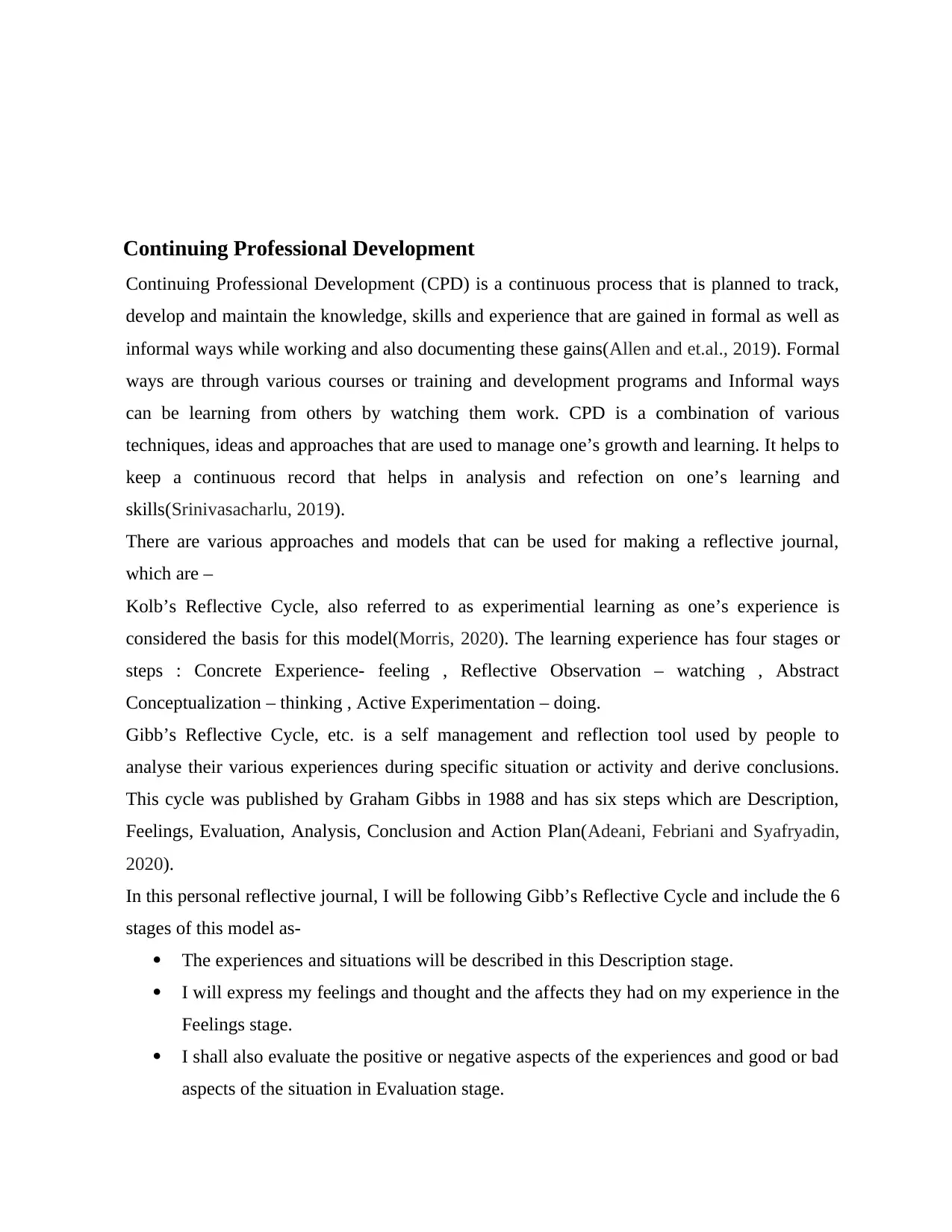
Continuing Professional Development
Continuing Professional Development (CPD) is a continuous process that is planned to track,
develop and maintain the knowledge, skills and experience that are gained in formal as well as
informal ways while working and also documenting these gains(Allen and et.al., 2019). Formal
ways are through various courses or training and development programs and Informal ways
can be learning from others by watching them work. CPD is a combination of various
techniques, ideas and approaches that are used to manage one’s growth and learning. It helps to
keep a continuous record that helps in analysis and refection on one’s learning and
skills(Srinivasacharlu, 2019).
There are various approaches and models that can be used for making a reflective journal,
which are –
Kolb’s Reflective Cycle, also referred to as experimential learning as one’s experience is
considered the basis for this model(Morris, 2020). The learning experience has four stages or
steps : Concrete Experience- feeling , Reflective Observation – watching , Abstract
Conceptualization – thinking , Active Experimentation – doing.
Gibb’s Reflective Cycle, etc. is a self management and reflection tool used by people to
analyse their various experiences during specific situation or activity and derive conclusions.
This cycle was published by Graham Gibbs in 1988 and has six steps which are Description,
Feelings, Evaluation, Analysis, Conclusion and Action Plan(Adeani, Febriani and Syafryadin,
2020).
In this personal reflective journal, I will be following Gibb’s Reflective Cycle and include the 6
stages of this model as-
The experiences and situations will be described in this Description stage.
I will express my feelings and thought and the affects they had on my experience in the
Feelings stage.
I shall also evaluate the positive or negative aspects of the experiences and good or bad
aspects of the situation in Evaluation stage.
Continuing Professional Development (CPD) is a continuous process that is planned to track,
develop and maintain the knowledge, skills and experience that are gained in formal as well as
informal ways while working and also documenting these gains(Allen and et.al., 2019). Formal
ways are through various courses or training and development programs and Informal ways
can be learning from others by watching them work. CPD is a combination of various
techniques, ideas and approaches that are used to manage one’s growth and learning. It helps to
keep a continuous record that helps in analysis and refection on one’s learning and
skills(Srinivasacharlu, 2019).
There are various approaches and models that can be used for making a reflective journal,
which are –
Kolb’s Reflective Cycle, also referred to as experimential learning as one’s experience is
considered the basis for this model(Morris, 2020). The learning experience has four stages or
steps : Concrete Experience- feeling , Reflective Observation – watching , Abstract
Conceptualization – thinking , Active Experimentation – doing.
Gibb’s Reflective Cycle, etc. is a self management and reflection tool used by people to
analyse their various experiences during specific situation or activity and derive conclusions.
This cycle was published by Graham Gibbs in 1988 and has six steps which are Description,
Feelings, Evaluation, Analysis, Conclusion and Action Plan(Adeani, Febriani and Syafryadin,
2020).
In this personal reflective journal, I will be following Gibb’s Reflective Cycle and include the 6
stages of this model as-
The experiences and situations will be described in this Description stage.
I will express my feelings and thought and the affects they had on my experience in the
Feelings stage.
I shall also evaluate the positive or negative aspects of the experiences and good or bad
aspects of the situation in Evaluation stage.
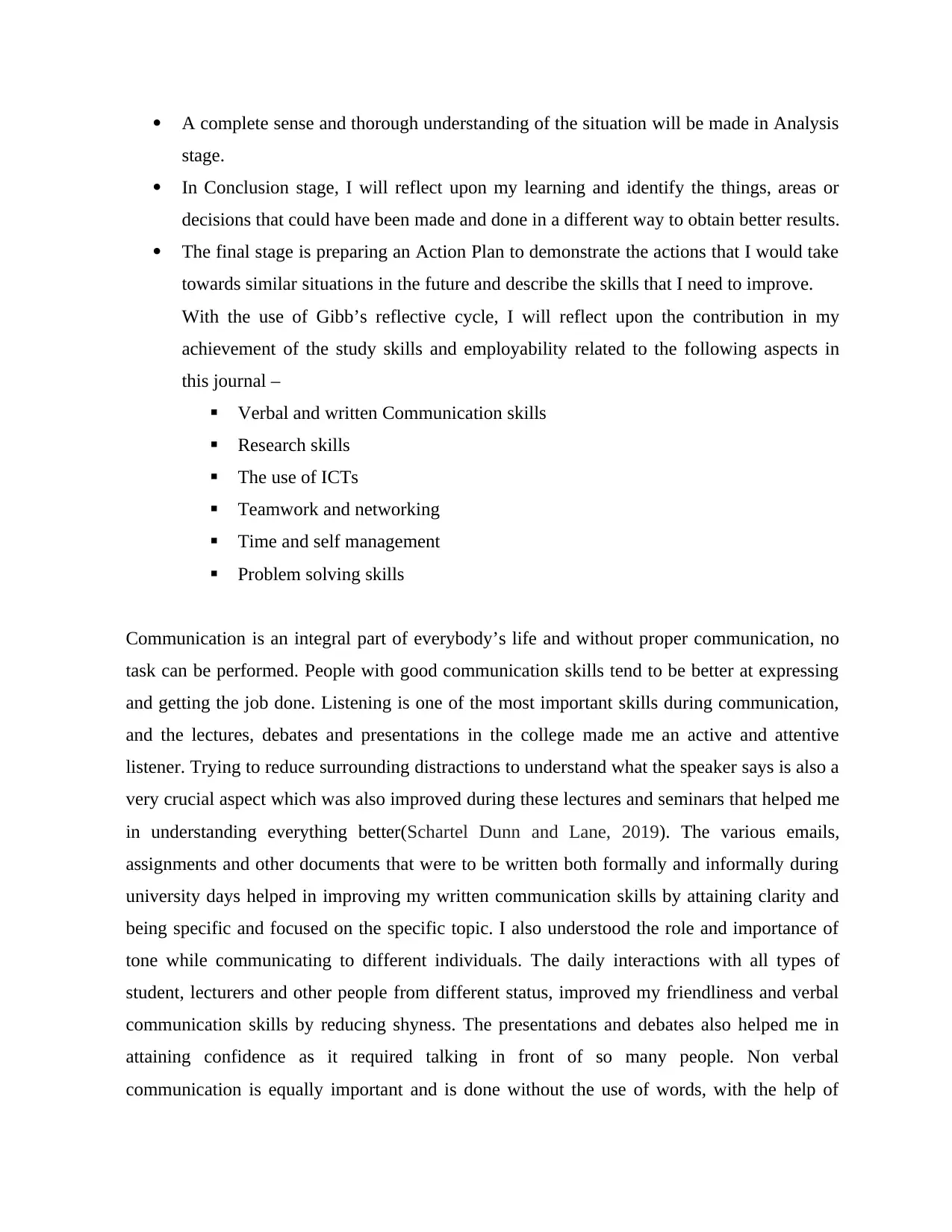
A complete sense and thorough understanding of the situation will be made in Analysis
stage.
In Conclusion stage, I will reflect upon my learning and identify the things, areas or
decisions that could have been made and done in a different way to obtain better results.
The final stage is preparing an Action Plan to demonstrate the actions that I would take
towards similar situations in the future and describe the skills that I need to improve.
With the use of Gibb’s reflective cycle, I will reflect upon the contribution in my
achievement of the study skills and employability related to the following aspects in
this journal –
Verbal and written Communication skills
Research skills
The use of ICTs
Teamwork and networking
Time and self management
Problem solving skills
Communication is an integral part of everybody’s life and without proper communication, no
task can be performed. People with good communication skills tend to be better at expressing
and getting the job done. Listening is one of the most important skills during communication,
and the lectures, debates and presentations in the college made me an active and attentive
listener. Trying to reduce surrounding distractions to understand what the speaker says is also a
very crucial aspect which was also improved during these lectures and seminars that helped me
in understanding everything better(Schartel Dunn and Lane, 2019). The various emails,
assignments and other documents that were to be written both formally and informally during
university days helped in improving my written communication skills by attaining clarity and
being specific and focused on the specific topic. I also understood the role and importance of
tone while communicating to different individuals. The daily interactions with all types of
student, lecturers and other people from different status, improved my friendliness and verbal
communication skills by reducing shyness. The presentations and debates also helped me in
attaining confidence as it required talking in front of so many people. Non verbal
communication is equally important and is done without the use of words, with the help of
stage.
In Conclusion stage, I will reflect upon my learning and identify the things, areas or
decisions that could have been made and done in a different way to obtain better results.
The final stage is preparing an Action Plan to demonstrate the actions that I would take
towards similar situations in the future and describe the skills that I need to improve.
With the use of Gibb’s reflective cycle, I will reflect upon the contribution in my
achievement of the study skills and employability related to the following aspects in
this journal –
Verbal and written Communication skills
Research skills
The use of ICTs
Teamwork and networking
Time and self management
Problem solving skills
Communication is an integral part of everybody’s life and without proper communication, no
task can be performed. People with good communication skills tend to be better at expressing
and getting the job done. Listening is one of the most important skills during communication,
and the lectures, debates and presentations in the college made me an active and attentive
listener. Trying to reduce surrounding distractions to understand what the speaker says is also a
very crucial aspect which was also improved during these lectures and seminars that helped me
in understanding everything better(Schartel Dunn and Lane, 2019). The various emails,
assignments and other documents that were to be written both formally and informally during
university days helped in improving my written communication skills by attaining clarity and
being specific and focused on the specific topic. I also understood the role and importance of
tone while communicating to different individuals. The daily interactions with all types of
student, lecturers and other people from different status, improved my friendliness and verbal
communication skills by reducing shyness. The presentations and debates also helped me in
attaining confidence as it required talking in front of so many people. Non verbal
communication is equally important and is done without the use of words, with the help of
⊘ This is a preview!⊘
Do you want full access?
Subscribe today to unlock all pages.

Trusted by 1+ million students worldwide

face, eyes, hands and body. Facial expressions, body posture, head and hand movements, etc.
make the first impression of people on others. Meetings and interactions with people from
different age groups, status etc. helped me in improving my non-verbal communications too. A
reflection onto all these things clearly shows that my communication skills were greatly
enhanced during these years in university which will also be helpful for me during interviews,
while working and also all other aspects in my life.
To enhance the knowledge of students on various topics, universities give them several
assignments that requires a thorough understanding of the topic to complete the given project.
To understand the topic in depth, students have to research about it though newspapers, various
websites, books etc.( Wongpinunwatana, 2019). I think the more I study or research on a topic,
the better I will be able to write or speak about it. For an effective research, finding a reliable
and trusted source and understanding how to handle the source and derive required information
from it is very necessary. Finding good quality content and texts created by the field experts
can add value to the assignment or project. College libraries are the best source to obtain
information and the new guideline called CRAP or CRAAP has been very useful for me to get
the most reliable information. CRAAP stands for Currency that ensures that the information
and material obtained is modern and adjusted to recent changes ; Reliability to ensure the data
is written without any mistakes and errors and can be trusted; Accuracy to ensure the relevance
of the information to the topic and it is accurate; Authority to ensure the data stated was written
by a author who has is reputed and has required degree and experience; P to ensure that the
publisher’s point of purpose is not to push their own agendas.
Teamwork and networking is also very important to get any job done. I do not expect to do all
my tasks on my own. Coordinating with other people and maintaining harmony in the team can
help in getting the job done more effectively and efficiently. In colleges also, teamwork and
networking was emphasized by giving group projects to the students so that they can
understand the importance of teamwork as they make people handle criticism positively and
maintain healthy relations with the team members(Marin-Garcia, Villaescusa and Bonavía,
2019). As skills can be learnt and developed faster in groups as knowledge and experience of
everyone is shared with other members of the group and everyone can learn from each other.
Networking also help as the more you interact with people, the more confidence and
knowledge you gain. I could also enhance my communication skills during those group
make the first impression of people on others. Meetings and interactions with people from
different age groups, status etc. helped me in improving my non-verbal communications too. A
reflection onto all these things clearly shows that my communication skills were greatly
enhanced during these years in university which will also be helpful for me during interviews,
while working and also all other aspects in my life.
To enhance the knowledge of students on various topics, universities give them several
assignments that requires a thorough understanding of the topic to complete the given project.
To understand the topic in depth, students have to research about it though newspapers, various
websites, books etc.( Wongpinunwatana, 2019). I think the more I study or research on a topic,
the better I will be able to write or speak about it. For an effective research, finding a reliable
and trusted source and understanding how to handle the source and derive required information
from it is very necessary. Finding good quality content and texts created by the field experts
can add value to the assignment or project. College libraries are the best source to obtain
information and the new guideline called CRAP or CRAAP has been very useful for me to get
the most reliable information. CRAAP stands for Currency that ensures that the information
and material obtained is modern and adjusted to recent changes ; Reliability to ensure the data
is written without any mistakes and errors and can be trusted; Accuracy to ensure the relevance
of the information to the topic and it is accurate; Authority to ensure the data stated was written
by a author who has is reputed and has required degree and experience; P to ensure that the
publisher’s point of purpose is not to push their own agendas.
Teamwork and networking is also very important to get any job done. I do not expect to do all
my tasks on my own. Coordinating with other people and maintaining harmony in the team can
help in getting the job done more effectively and efficiently. In colleges also, teamwork and
networking was emphasized by giving group projects to the students so that they can
understand the importance of teamwork as they make people handle criticism positively and
maintain healthy relations with the team members(Marin-Garcia, Villaescusa and Bonavía,
2019). As skills can be learnt and developed faster in groups as knowledge and experience of
everyone is shared with other members of the group and everyone can learn from each other.
Networking also help as the more you interact with people, the more confidence and
knowledge you gain. I could also enhance my communication skills during those group
Paraphrase This Document
Need a fresh take? Get an instant paraphrase of this document with our AI Paraphraser
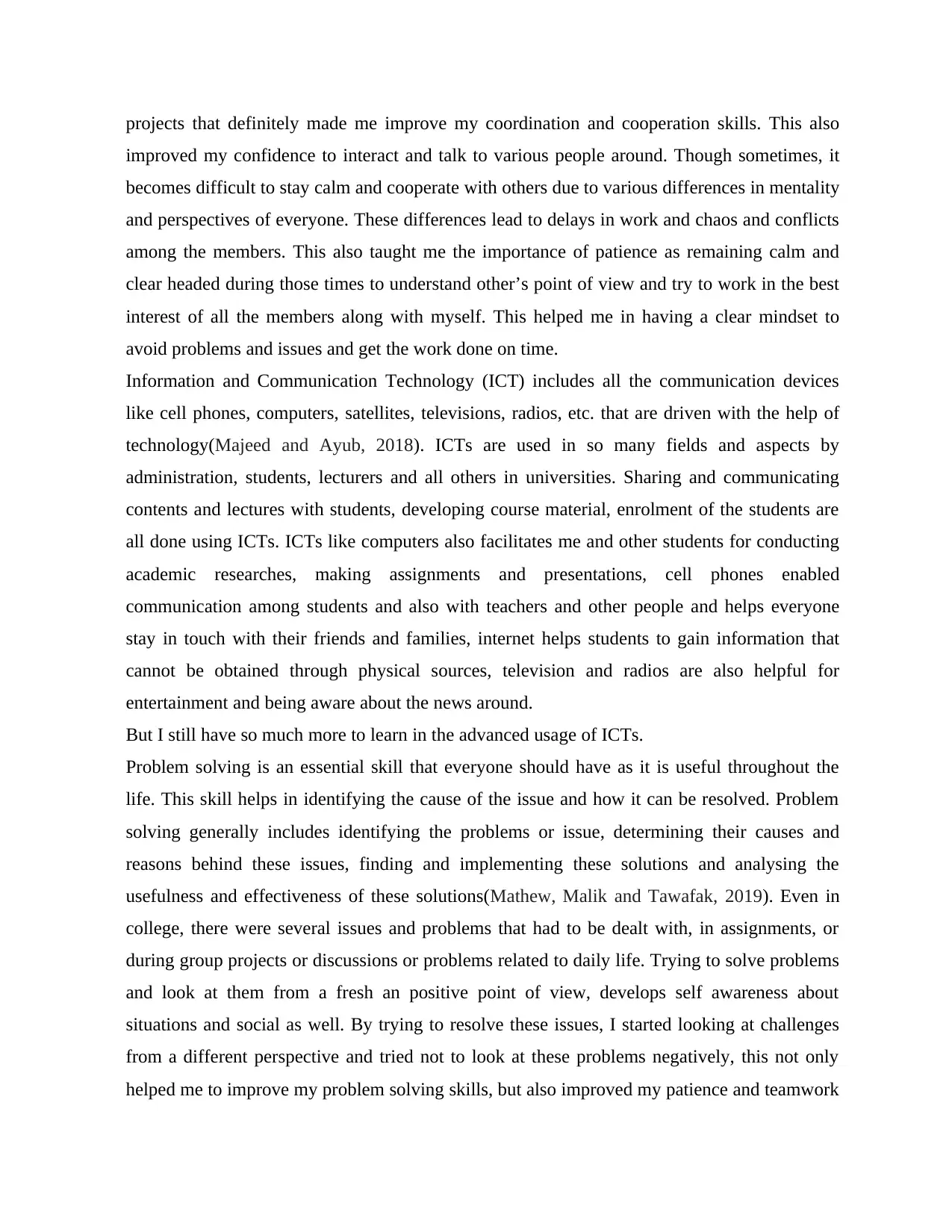
projects that definitely made me improve my coordination and cooperation skills. This also
improved my confidence to interact and talk to various people around. Though sometimes, it
becomes difficult to stay calm and cooperate with others due to various differences in mentality
and perspectives of everyone. These differences lead to delays in work and chaos and conflicts
among the members. This also taught me the importance of patience as remaining calm and
clear headed during those times to understand other’s point of view and try to work in the best
interest of all the members along with myself. This helped me in having a clear mindset to
avoid problems and issues and get the work done on time.
Information and Communication Technology (ICT) includes all the communication devices
like cell phones, computers, satellites, televisions, radios, etc. that are driven with the help of
technology(Majeed and Ayub, 2018). ICTs are used in so many fields and aspects by
administration, students, lecturers and all others in universities. Sharing and communicating
contents and lectures with students, developing course material, enrolment of the students are
all done using ICTs. ICTs like computers also facilitates me and other students for conducting
academic researches, making assignments and presentations, cell phones enabled
communication among students and also with teachers and other people and helps everyone
stay in touch with their friends and families, internet helps students to gain information that
cannot be obtained through physical sources, television and radios are also helpful for
entertainment and being aware about the news around.
But I still have so much more to learn in the advanced usage of ICTs.
Problem solving is an essential skill that everyone should have as it is useful throughout the
life. This skill helps in identifying the cause of the issue and how it can be resolved. Problem
solving generally includes identifying the problems or issue, determining their causes and
reasons behind these issues, finding and implementing these solutions and analysing the
usefulness and effectiveness of these solutions(Mathew, Malik and Tawafak, 2019). Even in
college, there were several issues and problems that had to be dealt with, in assignments, or
during group projects or discussions or problems related to daily life. Trying to solve problems
and look at them from a fresh an positive point of view, develops self awareness about
situations and social as well. By trying to resolve these issues, I started looking at challenges
from a different perspective and tried not to look at these problems negatively, this not only
helped me to improve my problem solving skills, but also improved my patience and teamwork
improved my confidence to interact and talk to various people around. Though sometimes, it
becomes difficult to stay calm and cooperate with others due to various differences in mentality
and perspectives of everyone. These differences lead to delays in work and chaos and conflicts
among the members. This also taught me the importance of patience as remaining calm and
clear headed during those times to understand other’s point of view and try to work in the best
interest of all the members along with myself. This helped me in having a clear mindset to
avoid problems and issues and get the work done on time.
Information and Communication Technology (ICT) includes all the communication devices
like cell phones, computers, satellites, televisions, radios, etc. that are driven with the help of
technology(Majeed and Ayub, 2018). ICTs are used in so many fields and aspects by
administration, students, lecturers and all others in universities. Sharing and communicating
contents and lectures with students, developing course material, enrolment of the students are
all done using ICTs. ICTs like computers also facilitates me and other students for conducting
academic researches, making assignments and presentations, cell phones enabled
communication among students and also with teachers and other people and helps everyone
stay in touch with their friends and families, internet helps students to gain information that
cannot be obtained through physical sources, television and radios are also helpful for
entertainment and being aware about the news around.
But I still have so much more to learn in the advanced usage of ICTs.
Problem solving is an essential skill that everyone should have as it is useful throughout the
life. This skill helps in identifying the cause of the issue and how it can be resolved. Problem
solving generally includes identifying the problems or issue, determining their causes and
reasons behind these issues, finding and implementing these solutions and analysing the
usefulness and effectiveness of these solutions(Mathew, Malik and Tawafak, 2019). Even in
college, there were several issues and problems that had to be dealt with, in assignments, or
during group projects or discussions or problems related to daily life. Trying to solve problems
and look at them from a fresh an positive point of view, develops self awareness about
situations and social as well. By trying to resolve these issues, I started looking at challenges
from a different perspective and tried not to look at these problems negatively, this not only
helped me to improve my problem solving skills, but also improved my patience and teamwork
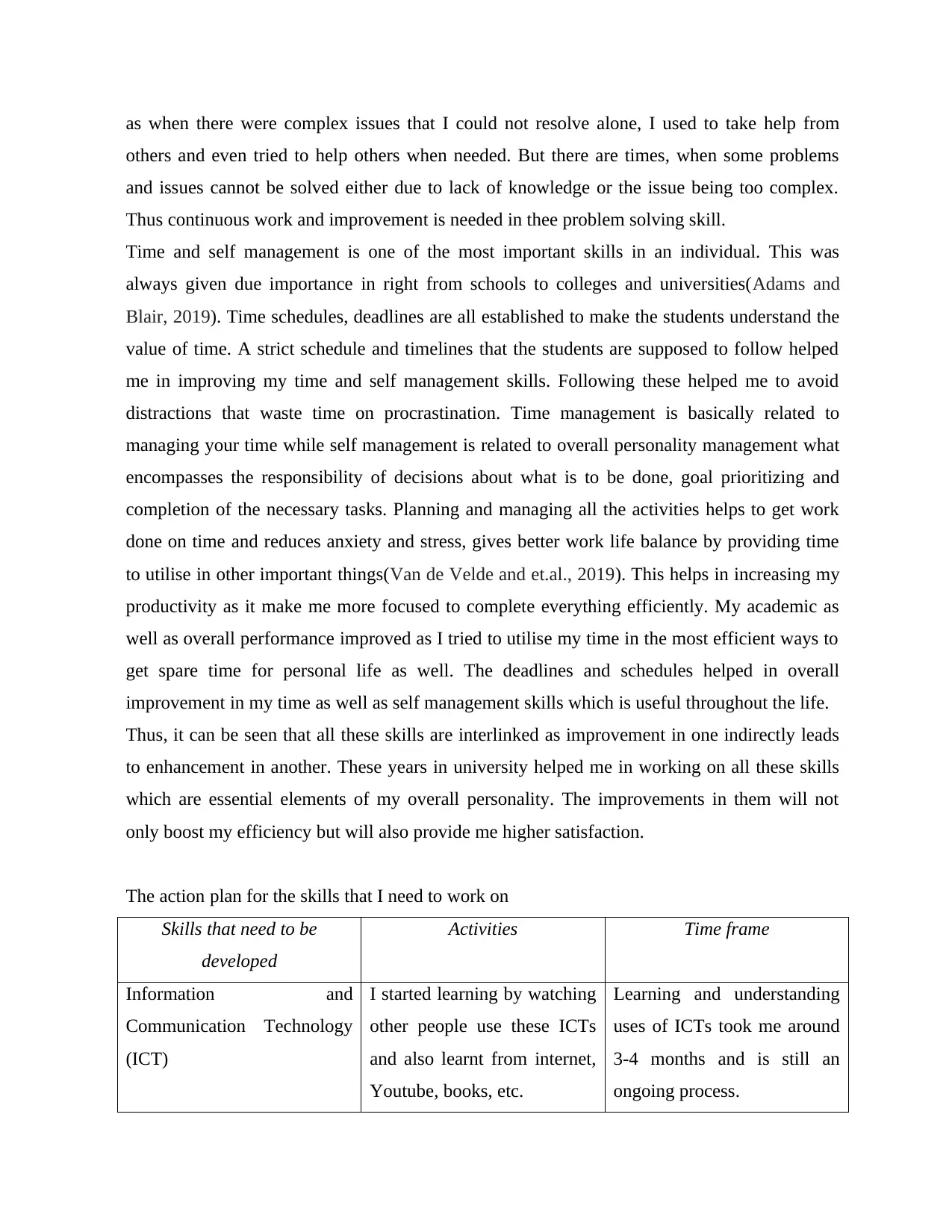
as when there were complex issues that I could not resolve alone, I used to take help from
others and even tried to help others when needed. But there are times, when some problems
and issues cannot be solved either due to lack of knowledge or the issue being too complex.
Thus continuous work and improvement is needed in thee problem solving skill.
Time and self management is one of the most important skills in an individual. This was
always given due importance in right from schools to colleges and universities(Adams and
Blair, 2019). Time schedules, deadlines are all established to make the students understand the
value of time. A strict schedule and timelines that the students are supposed to follow helped
me in improving my time and self management skills. Following these helped me to avoid
distractions that waste time on procrastination. Time management is basically related to
managing your time while self management is related to overall personality management what
encompasses the responsibility of decisions about what is to be done, goal prioritizing and
completion of the necessary tasks. Planning and managing all the activities helps to get work
done on time and reduces anxiety and stress, gives better work life balance by providing time
to utilise in other important things(Van de Velde and et.al., 2019). This helps in increasing my
productivity as it make me more focused to complete everything efficiently. My academic as
well as overall performance improved as I tried to utilise my time in the most efficient ways to
get spare time for personal life as well. The deadlines and schedules helped in overall
improvement in my time as well as self management skills which is useful throughout the life.
Thus, it can be seen that all these skills are interlinked as improvement in one indirectly leads
to enhancement in another. These years in university helped me in working on all these skills
which are essential elements of my overall personality. The improvements in them will not
only boost my efficiency but will also provide me higher satisfaction.
The action plan for the skills that I need to work on
Skills that need to be
developed
Activities Time frame
Information and
Communication Technology
(ICT)
I started learning by watching
other people use these ICTs
and also learnt from internet,
Youtube, books, etc.
Learning and understanding
uses of ICTs took me around
3-4 months and is still an
ongoing process.
others and even tried to help others when needed. But there are times, when some problems
and issues cannot be solved either due to lack of knowledge or the issue being too complex.
Thus continuous work and improvement is needed in thee problem solving skill.
Time and self management is one of the most important skills in an individual. This was
always given due importance in right from schools to colleges and universities(Adams and
Blair, 2019). Time schedules, deadlines are all established to make the students understand the
value of time. A strict schedule and timelines that the students are supposed to follow helped
me in improving my time and self management skills. Following these helped me to avoid
distractions that waste time on procrastination. Time management is basically related to
managing your time while self management is related to overall personality management what
encompasses the responsibility of decisions about what is to be done, goal prioritizing and
completion of the necessary tasks. Planning and managing all the activities helps to get work
done on time and reduces anxiety and stress, gives better work life balance by providing time
to utilise in other important things(Van de Velde and et.al., 2019). This helps in increasing my
productivity as it make me more focused to complete everything efficiently. My academic as
well as overall performance improved as I tried to utilise my time in the most efficient ways to
get spare time for personal life as well. The deadlines and schedules helped in overall
improvement in my time as well as self management skills which is useful throughout the life.
Thus, it can be seen that all these skills are interlinked as improvement in one indirectly leads
to enhancement in another. These years in university helped me in working on all these skills
which are essential elements of my overall personality. The improvements in them will not
only boost my efficiency but will also provide me higher satisfaction.
The action plan for the skills that I need to work on
Skills that need to be
developed
Activities Time frame
Information and
Communication Technology
(ICT)
I started learning by watching
other people use these ICTs
and also learnt from internet,
Youtube, books, etc.
Learning and understanding
uses of ICTs took me around
3-4 months and is still an
ongoing process.
⊘ This is a preview!⊘
Do you want full access?
Subscribe today to unlock all pages.

Trusted by 1+ million students worldwide
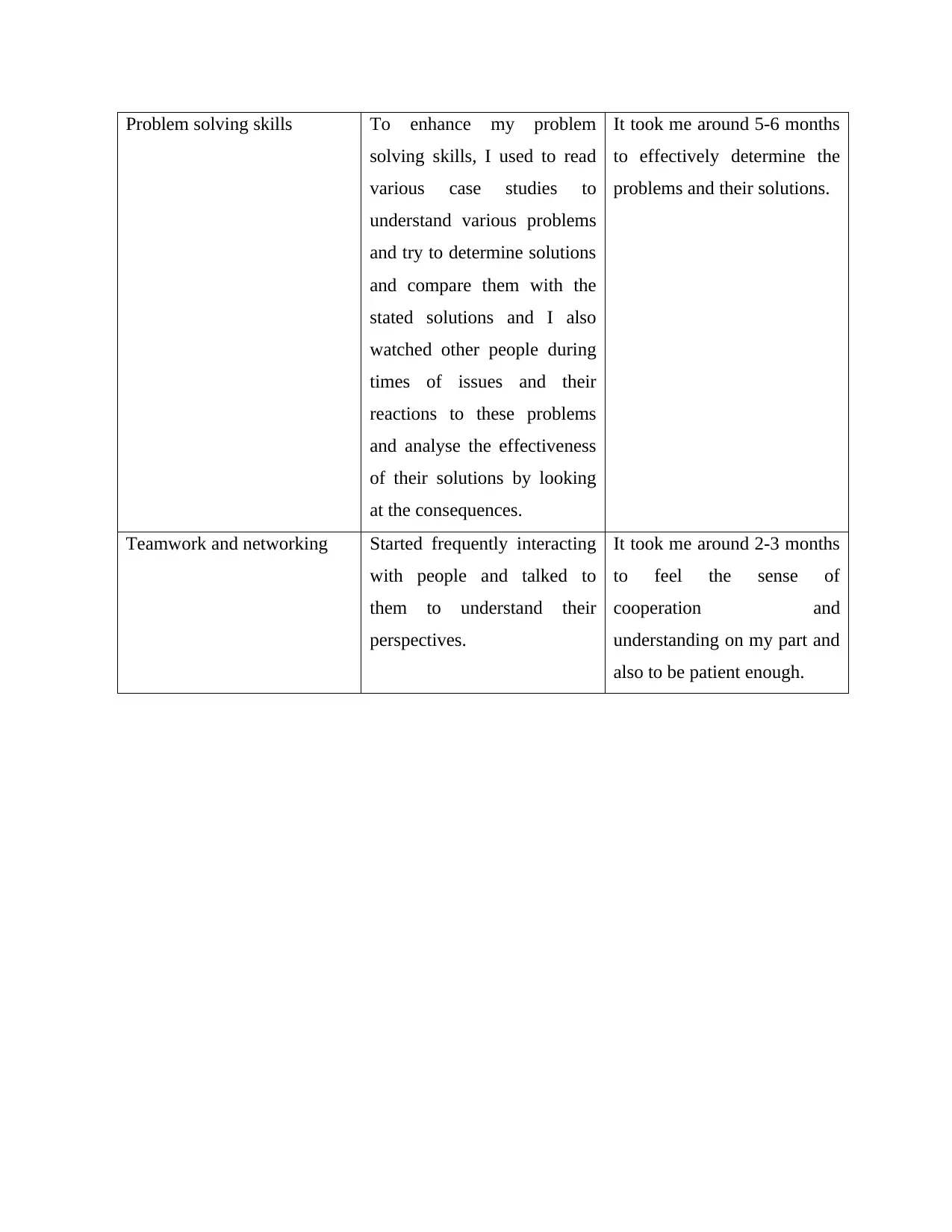
Problem solving skills To enhance my problem
solving skills, I used to read
various case studies to
understand various problems
and try to determine solutions
and compare them with the
stated solutions and I also
watched other people during
times of issues and their
reactions to these problems
and analyse the effectiveness
of their solutions by looking
at the consequences.
It took me around 5-6 months
to effectively determine the
problems and their solutions.
Teamwork and networking Started frequently interacting
with people and talked to
them to understand their
perspectives.
It took me around 2-3 months
to feel the sense of
cooperation and
understanding on my part and
also to be patient enough.
solving skills, I used to read
various case studies to
understand various problems
and try to determine solutions
and compare them with the
stated solutions and I also
watched other people during
times of issues and their
reactions to these problems
and analyse the effectiveness
of their solutions by looking
at the consequences.
It took me around 5-6 months
to effectively determine the
problems and their solutions.
Teamwork and networking Started frequently interacting
with people and talked to
them to understand their
perspectives.
It took me around 2-3 months
to feel the sense of
cooperation and
understanding on my part and
also to be patient enough.
Paraphrase This Document
Need a fresh take? Get an instant paraphrase of this document with our AI Paraphraser
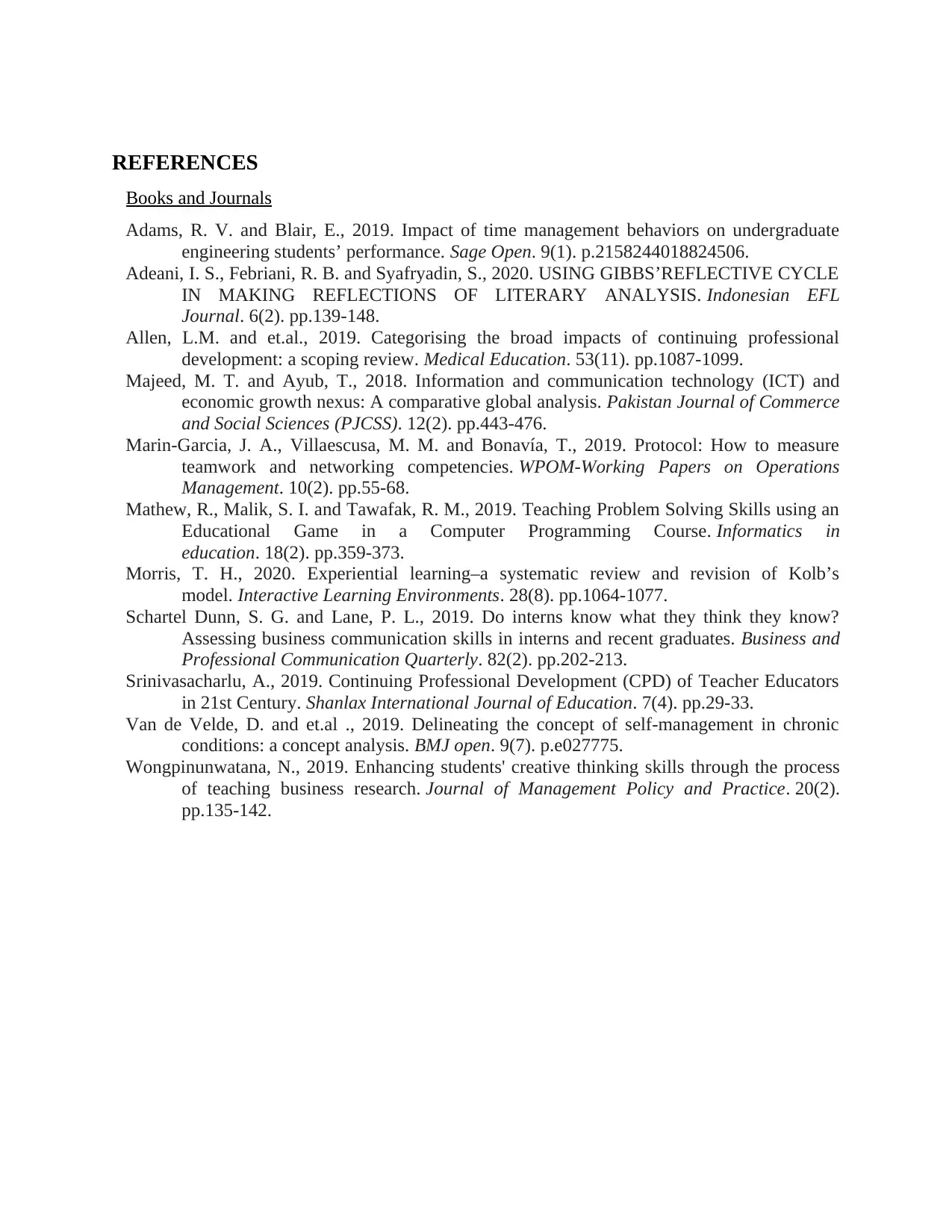
REFERENCES
Books and Journals
Adams, R. V. and Blair, E., 2019. Impact of time management behaviors on undergraduate
engineering students’ performance. Sage Open. 9(1). p.2158244018824506.
Adeani, I. S., Febriani, R. B. and Syafryadin, S., 2020. USING GIBBS’REFLECTIVE CYCLE
IN MAKING REFLECTIONS OF LITERARY ANALYSIS. Indonesian EFL
Journal. 6(2). pp.139-148.
Allen, L.M. and et.al., 2019. Categorising the broad impacts of continuing professional
development: a scoping review. Medical Education. 53(11). pp.1087-1099.
Majeed, M. T. and Ayub, T., 2018. Information and communication technology (ICT) and
economic growth nexus: A comparative global analysis. Pakistan Journal of Commerce
and Social Sciences (PJCSS). 12(2). pp.443-476.
Marin-Garcia, J. A., Villaescusa, M. M. and Bonavía, T., 2019. Protocol: How to measure
teamwork and networking competencies. WPOM-Working Papers on Operations
Management. 10(2). pp.55-68.
Mathew, R., Malik, S. I. and Tawafak, R. M., 2019. Teaching Problem Solving Skills using an
Educational Game in a Computer Programming Course. Informatics in
education. 18(2). pp.359-373.
Morris, T. H., 2020. Experiential learning–a systematic review and revision of Kolb’s
model. Interactive Learning Environments. 28(8). pp.1064-1077.
Schartel Dunn, S. G. and Lane, P. L., 2019. Do interns know what they think they know?
Assessing business communication skills in interns and recent graduates. Business and
Professional Communication Quarterly. 82(2). pp.202-213.
Srinivasacharlu, A., 2019. Continuing Professional Development (CPD) of Teacher Educators
in 21st Century. Shanlax International Journal of Education. 7(4). pp.29-33.
Van de Velde, D. and et.al ., 2019. Delineating the concept of self-management in chronic
conditions: a concept analysis. BMJ open. 9(7). p.e027775.
Wongpinunwatana, N., 2019. Enhancing students' creative thinking skills through the process
of teaching business research. Journal of Management Policy and Practice. 20(2).
pp.135-142.
Books and Journals
Adams, R. V. and Blair, E., 2019. Impact of time management behaviors on undergraduate
engineering students’ performance. Sage Open. 9(1). p.2158244018824506.
Adeani, I. S., Febriani, R. B. and Syafryadin, S., 2020. USING GIBBS’REFLECTIVE CYCLE
IN MAKING REFLECTIONS OF LITERARY ANALYSIS. Indonesian EFL
Journal. 6(2). pp.139-148.
Allen, L.M. and et.al., 2019. Categorising the broad impacts of continuing professional
development: a scoping review. Medical Education. 53(11). pp.1087-1099.
Majeed, M. T. and Ayub, T., 2018. Information and communication technology (ICT) and
economic growth nexus: A comparative global analysis. Pakistan Journal of Commerce
and Social Sciences (PJCSS). 12(2). pp.443-476.
Marin-Garcia, J. A., Villaescusa, M. M. and Bonavía, T., 2019. Protocol: How to measure
teamwork and networking competencies. WPOM-Working Papers on Operations
Management. 10(2). pp.55-68.
Mathew, R., Malik, S. I. and Tawafak, R. M., 2019. Teaching Problem Solving Skills using an
Educational Game in a Computer Programming Course. Informatics in
education. 18(2). pp.359-373.
Morris, T. H., 2020. Experiential learning–a systematic review and revision of Kolb’s
model. Interactive Learning Environments. 28(8). pp.1064-1077.
Schartel Dunn, S. G. and Lane, P. L., 2019. Do interns know what they think they know?
Assessing business communication skills in interns and recent graduates. Business and
Professional Communication Quarterly. 82(2). pp.202-213.
Srinivasacharlu, A., 2019. Continuing Professional Development (CPD) of Teacher Educators
in 21st Century. Shanlax International Journal of Education. 7(4). pp.29-33.
Van de Velde, D. and et.al ., 2019. Delineating the concept of self-management in chronic
conditions: a concept analysis. BMJ open. 9(7). p.e027775.
Wongpinunwatana, N., 2019. Enhancing students' creative thinking skills through the process
of teaching business research. Journal of Management Policy and Practice. 20(2).
pp.135-142.
1 out of 8
Related Documents
Your All-in-One AI-Powered Toolkit for Academic Success.
+13062052269
info@desklib.com
Available 24*7 on WhatsApp / Email
![[object Object]](/_next/static/media/star-bottom.7253800d.svg)
Unlock your academic potential
Copyright © 2020–2026 A2Z Services. All Rights Reserved. Developed and managed by ZUCOL.


